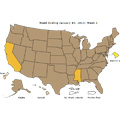 Experts in the United States are urging the public to be vaccinated against influenza, as flu levels hit epidemic levels across the country.
Experts in the United States are urging the public to be vaccinated against influenza, as flu levels hit epidemic levels across the country.
47 states are now reporting “widespread” flu activity prompting health authorities to urge people to stay home if they are suffering flu symptoms. Hospitals and clinics in some cities have been overwhelmed by the rise in cases.
In Chicago, hospitals turned away ambulances as it struggled to deal with an influx in patients with flu-like symptoms. Meanwhile, the governor of the state of New York, Andrew Cuomo, declared the flu epidemic to be a “public health emergency”.
The flu season started early in the US this year, according to officials, but it is too early to tell whether it will also end earlier than usual.
An analysis of Google Flu Trends – which some believe gives an earlier insight into flu activity than that available from official sources – suggests the outbreak could be worse than that seen during the H1N1 pandemic in 2009.
(Read: Twitter: the new flu-tracking tool? )
In Europe, officials reported increased flu activity in northern Europe but outbreaks are said to be “within what can be expected”.
#Influenza season developing with increasing trend in 16 #EU countries. However, so far within what can be expected bit.ly/11mB1cm
— Marc Sprenger (@ECDC_MSprenger) January 11, 2013
Vaccination recommended
In the US, flu vaccination is recommended for everyone aged older than six months. In line with WHO recommendations, pregnant women, older people, health workers and people with certain chronic conditions are also strongly encourages to have their annual flu shot.
US authorities say vaccination efforts should continue throughout flu season. “Any persons aged ≥6 months who have not received vaccination this season should be vaccinated,” according to the US Center for Disease Control (CDC).
Vaccination is the best protection against #flu but vaccine may be limited in some areas. Use flushot.healthmap.orgto locate vaccine.
— CDCgov (@CDCgov) January 12, 2013
Mandatory vaccination?
There has been particular attention in the US media on whether vaccination should be mandatory for health workers. Some hospitals make vaccination a condition of employment, although this has been a source of controversy and is opposed by health unions.
For hospitals where less than 90% of staff is vaccinated against flu, the US National Vaccine Advisory Committee “strongly encourages” making the vaccine compulsory. The advisory body says anyone who works in healthcare institutions – from doctors and nurses to janitors, porters and catering staff – should have the vaccine to protect themselves and patients.
The make-up of the flu vaccine changes every year as scientists try to match the vaccine against the three most commonly circulating strains of influenza virus. Early estimates describe the flu vaccine as being of “moderate” effectiveness this season. However, in its commentary on the data, the CDC notes that even moderately effective influenza vaccine “can reduce illness, antibiotic use, doctor visits, time lost from work, hospitalisations, and deaths”.



